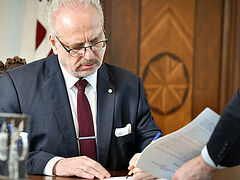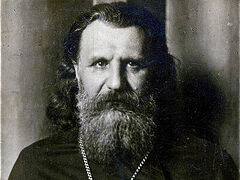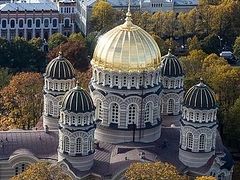Riga, September 9, 2022
 Nativity of Christ Cathedral in Riga. Photo: termatour.com
Nativity of Christ Cathedral in Riga. Photo: termatour.com
In the eyes of the Latvian government, the Latvian Orthodox Church is now completely independent and separate from the Russian Orthodox Church.
Yesterday, the Saeima, the Lavtian Parliament, “adopted urgent amendments to the Latvian Orthodox Church law, which establish the complete independence of the Latvian Orthodox Church with all its dioceses, parishes, and institutions from any Church power outside of Latvia (autocephalous Church),” reports the official Saeima website.
The decision came just days after Latvian President Egils Levits submitted the relevant draft law, saying the bill would “restore the historical status of the Latvian Orthodox Church,” arguing that independence was granted by Patriarch St. Tikhon in 1921.
The President’s announcement about the bill noted that the Church has “been informed” about its advancement through the government, but gives no indication as to whether the Church’s view on the matter was sought beforehand.
The Latvian Church has not publicly commented on the issue, though Russian Church reps have responded several times.
“With the adoption of the law, the already historically existing autonomy and independence of the Latvian Orthodox Church has been strengthened, preventing the influence or power of the Russian Orthodox Church over our Orthodox Church,” said Artuss Kaj, Chairman of the Human Rights and Public Affairs Committee responsible for the draft law in the Saeima, echoing the President.
However, as Archpriest Nikolai Balashov, advisor to the Russian Patriarch on external Church issues, explained in media comments, the Latvian president and Parliament don’t understand Church history.
In fact, Patriarch St. Tikhon granted the Latvian Church autonomy in 1921, not autocephaly, and this same status was reaffirmed by His Holiness Patriarch Alexei II in 1992 after the fall of the Soviet Union, Fr. Nikolai told RIA-Novosti.
Committee Chairman Kaj also argued that the decision to separate the Latvian Church from the Russian is in the interests of the Latvian Church itself, the whole of society, and national security.
The Parliament also argues that, “The definition of the scope of legal status in the law does not affect and does not interfere with the Church’s teachings of faith and canon law.”
According to the Parliamentary decision, the Church must harmonize its statutes with the new amendments by October 31, and must send information about the hierarchs of the Latvian Orthodox Church to the Office of the President by October 1.
“This is the Europe we have now!” Fr. Nikolai commented to Interfax-Religion yesterday. “The deadline for the revision of the statutes is especially admirable.”
“In the 21st century, in Latvia, in a secular state where the Church is separated from the state by the constitution, where hardly anyone could even say how many Orthodox there are in the Saeima, how is this possible? They surpassed the Middle Ages,” Fr. Nikolai said.
Follow OrthoChristian on Twitter, Vkontakte, Telegram, WhatsApp, MeWe, and Gab!




